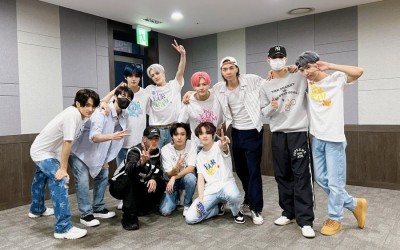EXO’s Baekhyun, Xiumin, And Chen Release New Statement With Rebuttal Of SM’s Claims

Following their initial statement announcing termination of their contracts with SM Entertainment, EXO’s Baekhyun, Xiumin, and Chen have released a new statement via their legal representative that refutes SM Entertainment’s statement from June 1.
Read the full statement below:
This is lawyer Lee Jae Hak of the law firm LIN, representing EXO members Baekhyun, Xiumin, and Chen (Byun Baek Hyun, Kim Min Seok, Kim Jong Dae, hereafter “artists”). Below, I will share the artists’ position regarding the claims made by SM Entertainment (hereafter “SM”) on June 1.
1. SM’s claim of an external influence’s intervention evades the essence which is the artists’ just exercising of rights and is additionally false information merely aiming to mislead public opinion.
The artists feel very distressed after seeing SM’s official statement that keeps talking about an external third party. They feel especially distressed as it seems to clearly show the perspective that SM views the artists with.
Is it a third party influence again?
Our artists are definitely adults who can think for themselves and take responsibility for their own decisions, and they are individuals with independent thoughts and judgments. They have felt some doubts for a decade, and they mustered up fearful and difficult courage with the thought that the questions they couldn’t dare bring up as rookies should at least be brought up now.
Our artists asked and listened to many people around them about what is right and what they need to do to find wise solutions. Of those people around them, there are family and acquaintances, seniors and juniors of the music industry, colleagues, and even staff who have worked together with the artists.
Of those individuals, there are those who shared concerns, those who shared warm encouragement, and those who also expressed their support. In response, we must ask if all of these people are third party influences, malicious influences, harmful influences.
Our artists are clearly human beings who can make decisions for themselves and take action for themselves.
The decision to find their rights such as requesting settlement data was made by themselves after long deliberation and deep thought, and it is definitely not due to the intervention of an external influence.
Additionally, SM is claiming that our artists have signed or attempted to sign dual contracts, but the three individuals Baekhyun, Chen, and Xiumin have not signed or attempted to sign other exclusive contracts besides their current exclusive contracts signed with SM. SM must refrain from making false claims.
SM said they would only allow the “viewing” of settlement data and not allow “provision” because of the concern that it would be shared with external parties. However, even if the artists are given the settlement data and receive consultation from not only their legal representative but also accountants around them or anyone else, this would be just exercising of the artists’ rights. Even in their exclusive contracts, there are no regulations that state that the artists cannot show the reports provided to them with anyone else and have to only review them alone. The contracts actually include a clause that the artists can review the data provided to them by SM for 30 days and should make appeals when necessary.
SM not even providing settlement data, and their legal representative and other celebrities advising them about the injustice of this situation. This inevitably raises the question of who should be criticizing the wrongdoing of who in this situation.
We would like to state again that the essence and truth of this case is that the artists and their legal representative have consistently requested the provision of settlement data, but SM eventually refused, which has led to contract termination.
2. According to their exclusive contracts, their settlement reports should be “provided,” so only allowing them to be “viewed” cannot be seen as the obligation being fulfilled.
The premise of SM’s claim is that allowing the “viewing” of the settlement reports is fulfilling SM’s obligation. However, according to their exclusive contracts, it is contracted that their settlement reports should be “provided.” Therefore, only allowing the reports to be “viewed” cannot be seen as the obligation being fulfilled.
Article 14 Paragraph 5 of the exclusive contracts signed between SM and the artists regulates, “Along with each settlement payment, A (SM) must provide the settlement report to B (artist). B can file appeals for 30 days since the date that the settlement report is received for reasons such as if the deducted costs have been overcalculated or if B’s income has been undercalculated, and A must faithfully provide the basis for settlement.” Therefore, the data must be “provided” and not just available for “viewing,” and the 30-day appeal period is also measured from the day that the report is “received.” It is not measured from the day that the report is “viewed.”
In addition, SM and the artists signed an additional “agreement” around 2014, and Article 4 regulates, “A provides the basis for settlement noted in Article 2 and Article 4 along with each payment (Paragraph 1),” and “According to the exclusive contract, A must provide a detailed settlement report once every year in June, and B can request an explanation about this from A (Paragraph 2).” This also regulates that the detailed settlement reports must be “provided.”
When it comes to the artists’ right to know and protection of their property rights, there is a major difference between “providing” data and allowing data to be “viewed” to the point that it is difficult to compare them. Especially as settlement reports are data within SM-owned territory, we want to ask in return if the accuracy of the data can be confirmed by simply telling the artists to come view them. Also, Article 14 Paragraph 5 of their exclusive contracts grants a 30-day review period from the day that the reports are received, and the exclusive contracts state that the artists should review the data sufficiently for 30 days and file appeals if necessary.
It is contracted that the settlement reports can be reviewed thoroughly for 30 days, but telling the artists to just come and see them and go is merely building justification for SM’s claim, “Anyway we did show you the data, so haven’t we done our duty?” And because we were able to speculate this kind of intention from SM, we especially couldn’t give up on being “provided” the reports and compromise by agreeing with just “viewing” them.
For reasons like this, the Fair Trade Commission’s Standard Exclusive Contract Form for Entertainers also states, “When requested by B, A should provide B with the settlement report along with the payment,” regulating that it should be “provided.”
Fundamentally, continuously bringing up the encroachment of confidential business information and refusing to provide data when artists ask to receive reports about the results of their activities does not justify the act of breaching exclusive contracts.
3. The artists and their legal representative have consistently requested the provision of settlement reports. The fact that SM eventually refused [to do so] and led us to notify the termination of the exclusive contracts is the key point of this case.
As mentioned earlier, under the premise that it is sufficient to enable [the artists] to “view” the settlement data, SM claims that the artists who had not raised any issues with the data before suddenly requested the provision of settlement data and notified them about the contract termination after appointing their new legal representatives.
It is the legitimate right of the artists to request settlement reports according to their exclusive contracts. And the artists took action after the legal representative provided legal consultation on their legitimate rights. For SM to claim that “the artists suddenly started making claims as soon as their legal representative changed” upon the artists’ action is no different from telling them to never exercise their legitimate rights.
Above all, claiming that the artists are being swayed by someone to demand the provision of settlement reports is an act of ignoring the artists’ high level of awareness of rights and insights. In the negotiation process, we confirmed the artists’ high level of awareness of rights and insights on the realization of their right to know.
And just as the records of our requests through certifications of contents remain objectively, the artists and their legal representative consistently requested the “provision” of the settlement reports from the beginning. Then, SM maintained their position that only “viewing” the settlement data should be enough. However, as you saw earlier, SM’s claim is not in line with the exclusive contracts which is why we could not accept [their claim], and since the gap between the parties’ positions could not be reduced in the end, the artists and their legal representative decided to terminate the exclusive contracts according to the precedent.
To restate the precedent, an exclusive contract is based on a high degree of trust. Thus, if the agency does not fulfill its obligation to provide settlement reports, the artists’ rights to review the settlement of profits and file an objection against the agency are not properly guaranteed, resulting in failure to provide settlement reports to be a reason for terminating the exclusive contract (refer to Seoul High Court order from 2019Na2034976 on January 31, 2020. In short, settlement reports must be “provided”).
This is [how the situation] progressed between SM and the artists related to the settlement data so far. However, claiming as if the artists or their legal representative changed their position again and again is far from the truth, and it is an act of distorting and misleading the key point of this incident.
4. The problem with the excessively long-term exclusive contract period, which is unilaterally unfavorable to artists beyond the minimum reasonable extent.
As already addressed in the first press release, the artists previously signed exclusive contracts with SM for over 12 to 13 years. This is far beyond the seven-year contract period determined by the Fair Trade Commission’s Standard Exclusive Contract Form for Entertainers and is unilaterally unfavorable to the artists to the degree that exceeds the minimum reasonable extent.
SM is trying to claim a contract period of at least 17 to 18 years to the artists, respectively, by having them sign the subsequent exclusive contracts again, as if the 12 to 13 years of contract period is not enough for them.
We would like to point out again that the act of signing a subsequent exclusive contract falls under Article 45, Paragraph 1 (6) of the Monopoly Regulation and Fair Trade Act, “the act of implementing the transactions by unduly taking advantage of his/her position.” In other words, we regard that forcing a long-term contract period using a subsequent exclusive contract falls separately under “Compelled Provision of Economic Benefits” or “Imposing Disadvantages” in the attached Table 2 of the act’s decree.
With regard to this, SM argues that it is unreasonable for the artists, who had an attorney from a large law firm as their legal representative at the time of signing the subsequent exclusive contracts, to suddenly start claiming that the subsequent exclusive contracts are unfair as soon as their legal representative changed.
However, claiming that there is a problem with the act of claiming the objectively unfair contracts to be unjust because they appointed a new legal representative is only obscuring the essence of this issue.
According to Article 5, Paragraph 1 of the subsequent exclusive contract, “This contract is valid for 5 years from…However, in case the minimum number of albums stipulated in Article 4, Paragraph 4 is not released within the same period, the contract period will be automatically extended until the condition is fulfilled.” There is not even a maximum limit to the length of this automatically extended period.
As such, the article stating that the contract period will be automatically extended until [the artists fulfill the condition] to release a certain number of albums, without even maximum limit, is clearly a slave contract. The legal representative is pointing out that this falls under “the act of implementing the transactions by unduly taking advantage of his/her position,” and the artists are also in agreement.
Moreover, it is unjustifiable to try binding the artists by signing subsequent exclusive contracts that state a long-term contract period with no maximum limit when about a year still remains on the existing exclusive contracts. SM also did not pay the artists any down payment for the subsequent exclusive contracts.
Baekhyun, Xiumin, and Chen are seriously considering filing a complaint to the Fair Trade Commission regarding [SM’s] act of signing the existing exclusive contracts with such long-term contract periods as well as the unfair subsequent exclusive contracts.
5. Regarding future activities with EXO
Our artists are seeking ways to faithfully continue EXO activities together with the other EXO members even if they terminate their exclusive contracts with SM. In fact, during the process of negotiation with SM prior to this termination of their exclusive contracts, the artists preemptively proposed ideas to continue EXO activities even if Baekhyun, Chen, and Xiumin leave SM.
Aside from the issue of resolving the legal relationship with SM, the artists are sincerely and deeply grateful for the great love and support that fans showed to EXO for a long time. No matter how the legal issue gets resolved in the future, they will continue their activities as EXO diligently and whole-heartedly.
Source: Soompi
Other Articles
-

T-ara’s Hyomin Signs With New Agency
-

MC Mong Denies Involvement In EXO’s Baekhyun, Xiumin, And Chen’s Legal Battle With SM
-

NCT’s Doyoung, Taeyong, Johnny, And Jungwoo Show Love For NCT DREAM At Their Seoul Encore Concert
-

BLACKPINK’s Jisoo Tests Positive For COVID-19 + To Sit Out Upcoming Concerts In Japan
-

Wi Ha Joon Poses With Tom Holland And More At TAG Heuer’s Formula 1 Event In Monaco
-

aespa’s Giselle To Sit Out Group’s “Knowing Bros” Filming For Health Reasons
-

T.O.P Reveals He Has Withdrawn From BIGBANG
-

SM Releases Detailed Statement Refuting Baekhyun, Xiumin, And Chen’s Basis For Contract Termination
-

SM Suspects Third Party Is Behind Baekhyun, Xiumin, And Chen’s Contract Termination Notice + BPM Entertainment Responds
-

Kim So Eun’s And Song Jae Rim’s Agencies Deny Their Dating Rumors Again
-

Breaking: EXO’s Baekhyun, Xiumin, And Chen Notify SM Entertainment Of Contract Termination
-

BTS’s RM Announced As Ambassador For MND Agency for KIA Recovery & Identification
Genres
- Accident
- Action
- Adventure
- Alien
- Amnesia
- Ancient legend
- Animals
- Animation
- Arthouse
- Artificial Intelligence
- Award Winning
- Based on a Comic
- Based on True Story
- Betrayal
- Biography
- BL
- Bodyguard
- Bromance
- Business
- Chambara
- Childhood
- Christmas
- Cohabitation
- Cold Man
- Coma
- Comedy
- Concert
- Conglomerate
- Conspiracy
- Contract Relationship
- Corruption
- Crime
- Criminal
- Curse
- Dance
- Deity
- Demon
- Detective
- Disability
- Disaster
- Documentary
- Drama
- Eastern
- Educational
- Entertainment
- Environment
- Erotica
- Espionage
- Exorcism
- Exploitation
- Fairy
- Family
- Fantasy
- Fashion
- Feminism
- Food
- Foreign
- Friendship
- Game Developer
- Gangster
- Geishas
- Gore
- Goryeo Dynasty
- Grudge
- Gumiho
- Harem
- Hidden Identity
- Historical
- Horror
- Hostage
- Human
- Hypnotism
- Idol Drama
- Indie
- Instructional
- Investigation
- Jidai Geki
- Josei
- Kidnapping
- Kung Fu
- Law
- legal
- Lesbian
- LGBTQ+
- life
- Love Triangle
- Mafia
- Magic
- Manga
- Manhua
- Martial Arts
- Mature
- Medical
- melodrama
- Mermaid
- Military
- Miniseries
- Misunderstanding
- Monster
- Murder
- Music
- Musical
- Mystery
- Mythology
- Nature
- Neighbours
- Noir
- Novel
- Omnibus
- One shot
- Parody
- Phobia
- Poison
- police
- political
- Power Struggle
- Prison
- Professional
- Programmer
- psychiatry
- Psychological
- Reality
- Reality Show
- Reality TV
- Rebellion
- Religion
- Remake
- Republic
- Resurrection
- Revenge
- Rich Man
- Robot
- Romance
- RPG
- Rural
- Samurai
- Scholar
- School
- Sci-fi
- Seinen
- Serial Killer
- Short
- Sismance
- Sitcom
- Slapstick
- Slice of Life
- Society
- Soulmates
- Sports
- Supernatural
- Survival
- Suspense
- Swordsman
- Taiga drama
- Teamwork
- Tearjerker
- Teen
- Terrorist
- Thief
- Thriller
- Time Travel
- Tokusatsu
- Tomboy
- Tragedy
- Tragic Past
- Transmigration
- Trauma
- Treason
- Triad
- Underworld
- Unrequited Love
- urban drama
- Vampire
- Variety
- Variety show
- War
- Warrior
- Web Series
- Webtoon
- Werewolf
- Western
- Witch
- Workplace
- Wuxia
- Yakuza
- Yaoi
- Youth
- Yuri
- Zombie

